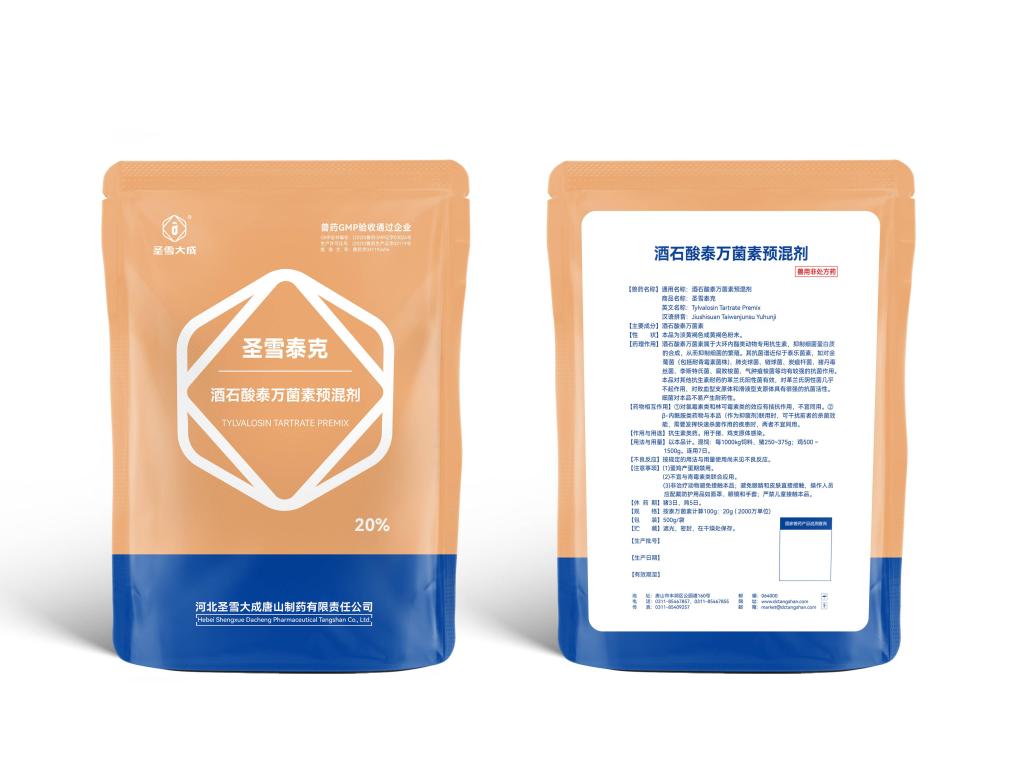Tel:+8618231198596

News
 CONTACT
CONTACT
 CONTACT
CONTACT
- Linkman:Linda Yao
- Tel: +8618231198596
- Email:linda.yao@dcpharma.cn
- Linkman:CHARLES.WANG
- Department:Overseas
- Tel: 0086 0311-85537378 0086 0311-85539701
News
Farmers employ tylvalosin tartrate premix to maintain high standards of animal health and welfare.
TIME:2024-09-13
Introduction
The agricultural sector is increasingly focused on sustainable and ethical practices that prioritize animal health and welfare. In this context, tylvalosin tartrate, a macrolide antibiotic, has become an integral tool for farmers aiming to uphold stringent standards of care. Formulated as a premix, tylvalosin tartrate can be efficiently and accurately administered to livestock, ensuring that animals receive the necessary protection against bacterial pathogens. This article explores the ways in which tylvalosin tartrate premixes contribute to maintaining high standards of animal health and welfare.
Enhancing Animal Health
Disease Prevention One of the primary uses of tylvalosin tartrate is in the prevention of bacterial diseases. By incorporating the antibiotic into a premix, farmers can administer it consistently and effectively to their herds. This proactive approach helps in reducing the incidence of diseases such as necrotic enteritis and proliferative enteropathy, which can cause significant morbidity and mortality if left untreated.
Treatment of Infections When bacterial infections do occur, timely and appropriate treatment is essential. Tylvalosin tartrate premixes can be used therapeutically to treat affected animals, alleviating symptoms and promoting recovery. Proper treatment not only improves individual animal health but also helps to maintain the overall health of the herd.
Promoting Ethical Farming Practices
Improving Animal Welfare Healthy animals are more resilient and less prone to stress-related issues. The use of tylvalosin tartrate premixes in preventing and treating diseases ensures that animals suffer less from illness and its associated discomfort. This aligns with ethical farming practices that emphasize the importance of minimizing animal suffering and ensuring humane treatment.
Sustainable Resource Management By preventing disease outbreaks, tylvalosin tartrate helps to reduce the need for additional veterinary interventions, thereby conserving resources such as labor, medications, and other inputs. This approach supports sustainable farming by minimizing waste and optimizing the use of available resources.
Supporting Productivity and Economic Viability
Enhanced Growth Performance Animals that are healthy and free from disease tend to exhibit better growth performance. Tylvalosin tartrate premixes can contribute to improved feed conversion rates and faster weight gain, which are critical metrics for livestock productivity. Enhanced performance translates into higher economic returns for farmers.
Reduced Mortality Rates Preventing disease outbreaks is key to reducing mortality rates within herds. Lower mortality rates mean fewer economic losses for farmers and contribute to the sustainability of livestock operations.
Addressing Public Concerns and Meeting Market Demands
Consumer Confidence Consumers are increasingly concerned about the ethical treatment of animals and the responsible use of antibiotics in food production. The judicious use of tylvalosin tartrate, supported by premix formulations, demonstrates a commitment to transparency and accountability. This can enhance consumer confidence in the products sourced from farms that adhere to high standards of animal health and welfare.
Market Access and Premium Pricing Farms that can demonstrate their commitment to animal health and welfare through the responsible use of antibiotics like tylvalosin tartrate may benefit from premium pricing and preferential market access. Such practices can create a competitive advantage and reinforce the business case for investing in high-quality animal care.
Conclusion
Tylvalosin tartrate premixes play a pivotal role in enabling farmers to maintain high standards of animal health and welfare. By preventing and treating bacterial diseases, these formulations support ethical farming practices, enhance animal welfare, and promote sustainable resource management. Furthermore, the responsible use of tylvalosin tartrate addresses public concerns and meets market demands for ethically produced food, reinforcing the economic viability and social responsibility of modern agricultural operations.
- Tel:+8618231198596
- Whatsapp:18231198596
- Chat With Skype







